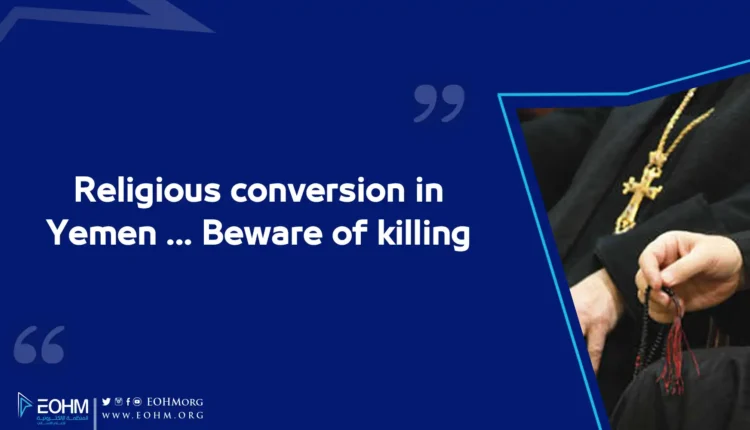
54 days of isolation in a dark room west of Sana’a, Noor’s hands and feet were tied by chains with one meal. This is what Noor (pseudonym), he was at the age of 25, suffered at the hands of his family and the reason for that was choosing a new religion.
Noor did not know that admitting his new religious faith to one of his brothers would lead him to that suffering which did not end until after making a deal with the family such “abdicating property, leaving the village without returning until after leaving his new religion.”
In a voice filled with heartbreak, he told Electronic Organization for Human Media “EOHM” about his suffering as a result of converting to a new religion or choosing another belief.
Noor said that the Houthi group detained me after the residents of the area had doubts and heard the issue of my conversion from Islam to another religion. Military crews blockaded my house and took me like a criminal. In the detention, they put me next to a group of Salafis and told them that I was an apostate. It seemed that the goal was to kill me, but I was protected by some individuals and told them that I am not a converter to another religion.
Many converters to other religions in Yemen experienced forms of torture by society and authority like Noor. Adam Sami lived a similar story after he chose to be irreligious, but while his father searching on his phone, he read his conversations with his friends as they mocked creationism. Sami said I was subjected to various types of violent beatings, insults, and mockery then my father decided to expel me from the house.
Legal challenges
Noor, who was deprived of his property, his family did not know that the Personal Status Law was on their side as it is forbidden for religious converters to obtain any inheritance from the Muslim family as stipulated in Article 305 of the Yemeni Personal Status Law and they are also prohibited from changing their names and religion in the official papers.
Noor can’t seek any help to any lawyer to support him. Lawyer Abdel Ghani Muhammad Al-Lasani explained the reason to “EOHM” by saying, “If the lawyer pleaded a case for any converter from Islam to other than Islam, The judge would ignore to it on his own and decided to convert it to the prosecution to turn the case into a criminal as he was an apostate in accordance with Article 259 of the Crimes and Penalties Law No. 12 of 1994.”
lawyer Faisal Al-Majidi
That was confirmed by lawyer Faisal Al-Majidi, who told EOHM “the Crimes and Penalties Law considered religious conversion as a hudud crime and the third chapter of it talked about crimes related to religion and the sanctity of the dead, including Article 259, which states: “Anyone who reverted from the Islam shall be punished with death, etc.”
In general, Yemeni society was born to reject the right of religious conversion. It developed that educational system in schools that supplied the children with the wars of apostasy as crimes against religion. In addition, judges studied at the Faculty of Sharia and Law not the Faculty of Law.
The individuals who were affected by those educational system, made the formulation of law and national legislation in the countries. This was reflected in the form of laws and interpretations that violated the rights of converters, treated them as criminals and punished them with death, although international human rights law obliges states to guarantee the freedom of the individual to change his religion and the freedom of converting any religion or belief of his choice, while the International law of Human Rights guarantees the freedom of the individual to choose his belief, and belief here may be religious or not.
Second Article
Yemen is a state whose religion is Islam as the second article of the country’s constitution indicated. Islam is the source of all legislation as the Third Article indicated, and these two articles contradicted the obligations of the sixth Article of the same constitution, which confirms acting with the United Nations Charter, the Universal Declaration of Human Rights and the rules of international law.
These contradictions made stakeholders towards Yemen express their worry about Yemen’s violation of its commitments that signed on it, as it was stated in the summary of information papers that was presented by stakeholders on Yemen 2019 about ” The Freedom Defense Coalition expressed their worry that Yemen’s constitution states that Yemen is an Islamic country governed by Sharia and that its criminal law prohibits apostasy and judged to the apostates to death”.
There are no national initiatives in Yemen to raise awareness of the rights of converters, and there is no local machinery to defend or protect the right to convert as freedom of belief. Human right organizations are lacking in activity towards this right.
Effects of the Yemeni war
There are no official or accurate statistics on the percentage of religious converters in Yemen but since the civil war in 2015, the pace of conversion from Islam to another religion to or to non-religion has increased due to the increase of violence between political Islam movements, and religious activity led by authorities of proselytization and Bahai.
An Adeni Christian, who did not want to be named, told EOHM that he and many of his friends converted to Christianity, but they hid that for fear of being targeted, and the reaction of their families. He confirmed “There were individuals who spent the entire years of the war in the detention centers of Aden, Taiz and Sana’a and were recently released, including who has been imprisoned for four years on charges of proselytization.”
There is a minority of Jews in Yemen whose emigration increased after the civil war except only six individuals, including the detainee “Salem Libby”. There were also the Baha’is, Christians, Ismailis, and irreligious people in the country. Religious groups became active after the war, whether groups affiliated with Al-Qaeda and ISIS who joined with the legitimate government that was recognized internationally, or the Ansar Allah group (Houthis), which runs the National Salvation Government that was not recognized internationally.
This activity affected the situation of religious converters, as they were subjected to violations reached to their assassination, as happened with Omar Batawil for 17 years who was assassinated on charges of apostasy, and Amjad Abdelrahman, who was assassinated on charges of atheism while a number of Baha’is were forcibly assassinated after being accused of apostasy.
Religious conversion is accusation!
Mostly, when anyone criticized the corrupt behavior of religious groups in Yemen, he was accused of new charges (atheist, secular), and incitement against him in social media. These accusations came out of social networks into reality, where the charge of religious crossing became the best option to get rid of opponents.
“You were Christian!” One of the prosecutors said it in Bashir Al-Bakari’s face, he was at the age of 44, when he was at the security of the Jabal Habashi Directorate – a village in western Taiz – an area belongs to the internationally recognized government where this charge put him in detention starting from Sunday, January 31, 2021.
Al-Bakari’s story as he told “EOHM” that he was accused of apostasy. He said: “I received a summons from the Jabal Habashi Police Station to support M.M.A.S., and after my attendance, I proved that the summons was incorrect, but the plaintiff said: “He was a Christian,” which made the case turn in another direction.
Religious conversion in Arabib
He added: “The criminal investigation officer opened another investigation, took my phone and everything I owned, kept them and ordered my imprisonment. Then he summoned me for Investigation and was writing the question and answering it by himself. When I demanded my rights to respond, He told me that I was an apostate, and in the form of a threat, he asked me to give him the phone lock code or they would use other methods with me. I was detained for a whole week with them because of this accusation, until they referred the case file to the Criminal Investigation Department in Taiz governorate, herewith a note of accusing me with proselytization.” Then he added” they said my punishment was death, but they released me after the charges were not proven against me.
last word
Bashir’s release from prison was not the end of the accusation, but he continued to suffer from societal discrimination, which developed to the extent of his death threat.
On 16 July, Al-Bokari said that he left the village to find a safe place to live, and until writing of this article, he was still fleeing from the village, leaving his family and children facing the risk of incitement against their father that in a society that treats religious converters as criminals.

التعليقات مغلقة.